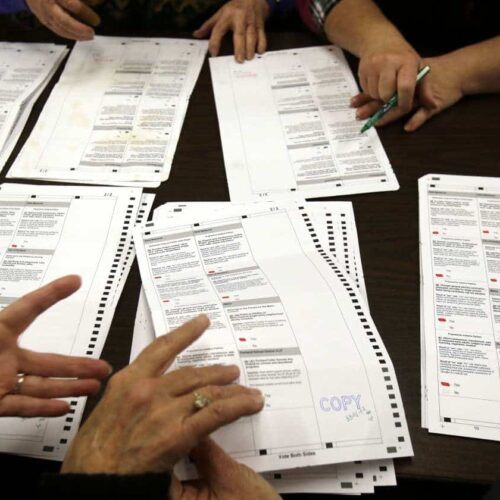Introduction
Having been stuck in a broken down Amtrak train from New York and then evacuated to another in a six-hour odyssey, I had time to ponder US infrastructure and the way a Keynesian response to the 2011 downturn didn’t go to infrastructure but to banks. Nick Kusnetz, our New York based elections and states reporting expert, has a piece today on the crumbling election infrastructure as we head in to the 2016 Presidential election.
“Democracy inaction” was his nice way into a piece looking at the problem of voting equipment, facilities, registers and the civil rights implications of attempts to limit voter registration.
Given the Bush-Gore history of all this and the offer by India — the world’s largest democracy — to help back then, it’s no wonder partners like Politico lapped up Nick’s story, giving us important reach and distribution. Their headline brings back memories: Is Ohio the Next Home of Hanging Chads?
Partnerships are a vital part of our strategy to give the greatest possible chance for impact from Public Integrity work far beyond our own websites. Our communications manager Bill Gray will be refining our strategy and focusing on key publications and audience groups from influencers to the masses.
Spotting a quirky story early can be just as effective and our political correspondent and regular fixture on Al Jazeera America, Dave Levinthal, got great pickup on a story this week related to what I hope is the temporary phenomenon of someone, or something, called Deez Nuts. Dave is great at hitting the short-term spot story to bring attention to our bigger work and commitment to political reporting. He and data journalist Chris Zubak-Skees used the Deez Nuts thing as a way to show how the GOP race is only the tip of an iceberg of candidates. Their work was rapidly referred to in New York Magazine, Jezebel, the Washington Post and Politico.
We also had a big burst of traffic to anolder story after Chris Zubak-Skees posted his very attractively presented interactive on the failure of Defense Department audits to a specialist discussion area on Reddit. It is a nice piece of work and strongly supported the reporting of Julia Harte.
Belated but important impact
We’re always looking at how our stories have real and measurable impact. One of the slow burners has been Jeff Kelly Lowenstein’s series exposing the state of American nursing homes. Today the Government Accountability Office announced an inquiry after a Senate committee called for it based in part on our work. Jeff’s piece also won a recent National Press Club award.
What we’re reading
Liz Essley Whyte in the States reporting team highlighted this in-depth piece in the Los Angeles Review of Books on reporting and why the official story is the easiest but only digging can get to something close to the truth.
Not a bad piece in the New York Times today on why European publishers are attacking — some might say blackmailing — Google.
In the “you-couldn’t make it up” department, Rebekah Brooks, tried and acquitted of involvement in the phone hacking scandal in the UK could be back running News Corporation in the UK by the end of the year, according to theFinancial Times [$]
The Economist has a good read on why Virtual Reality might actually be what it is cracked up to be this time. As it happens a friend of mine recently joined a US newspaper group as a VR journalist and an organization I am connected with, the Global Editors Network, is running a Silicon Valley study tour which includes a look at the prospects for news media and virtual reality.
I welcome any feedback on this note.

Join the conversation
Show Comments